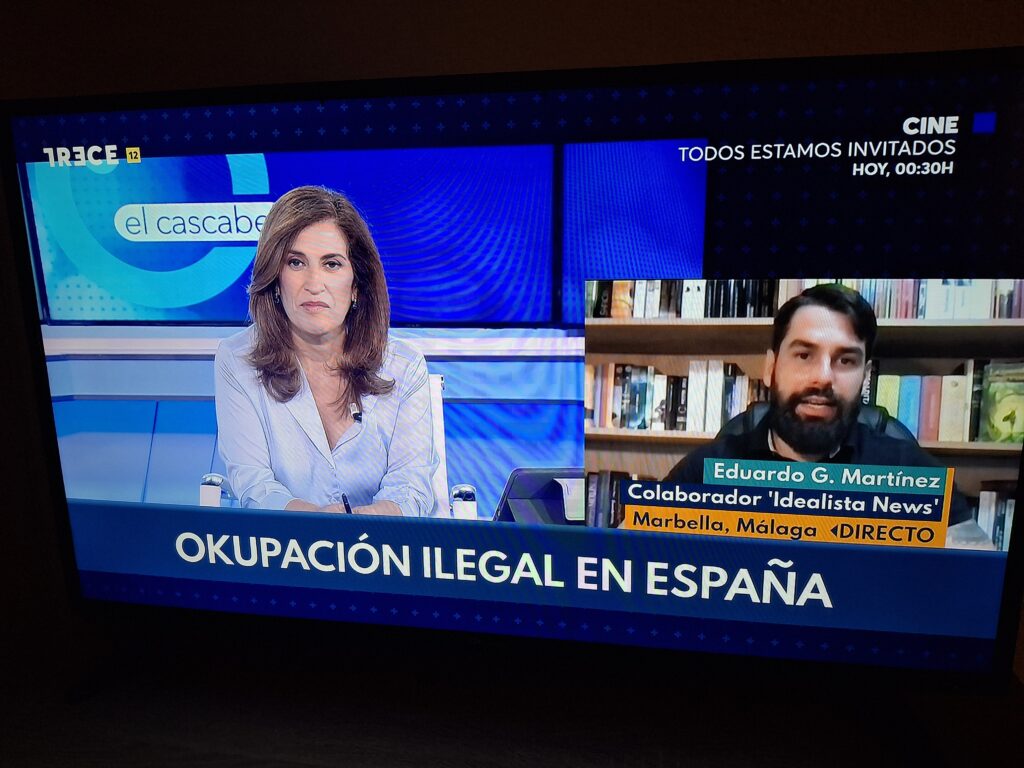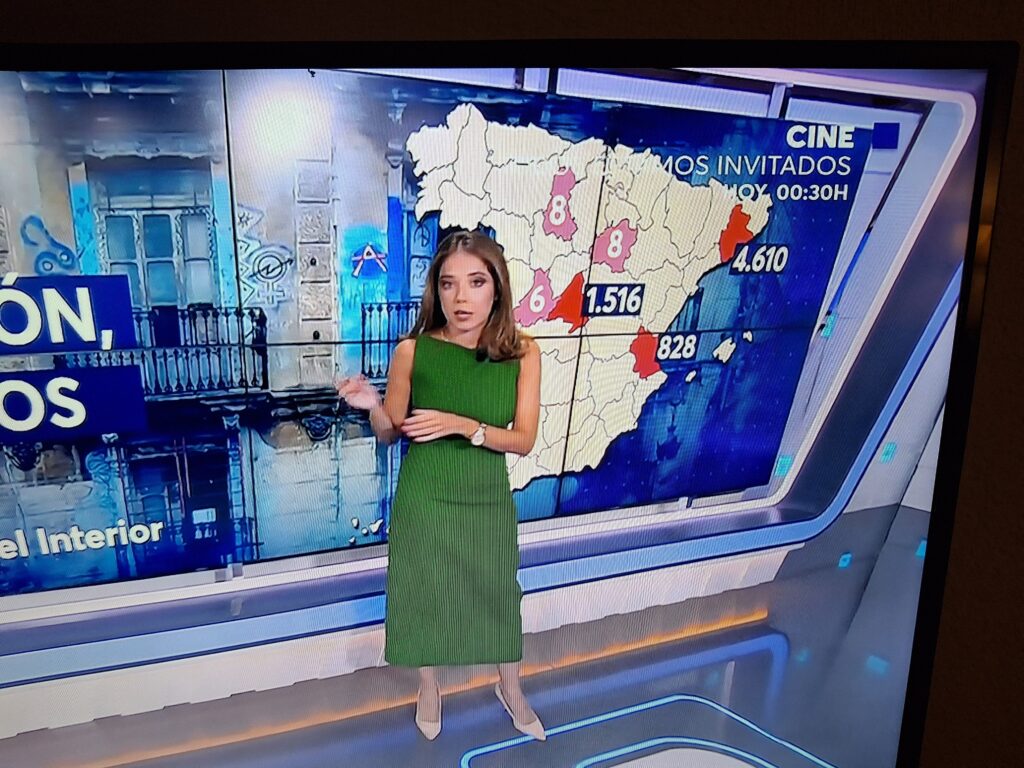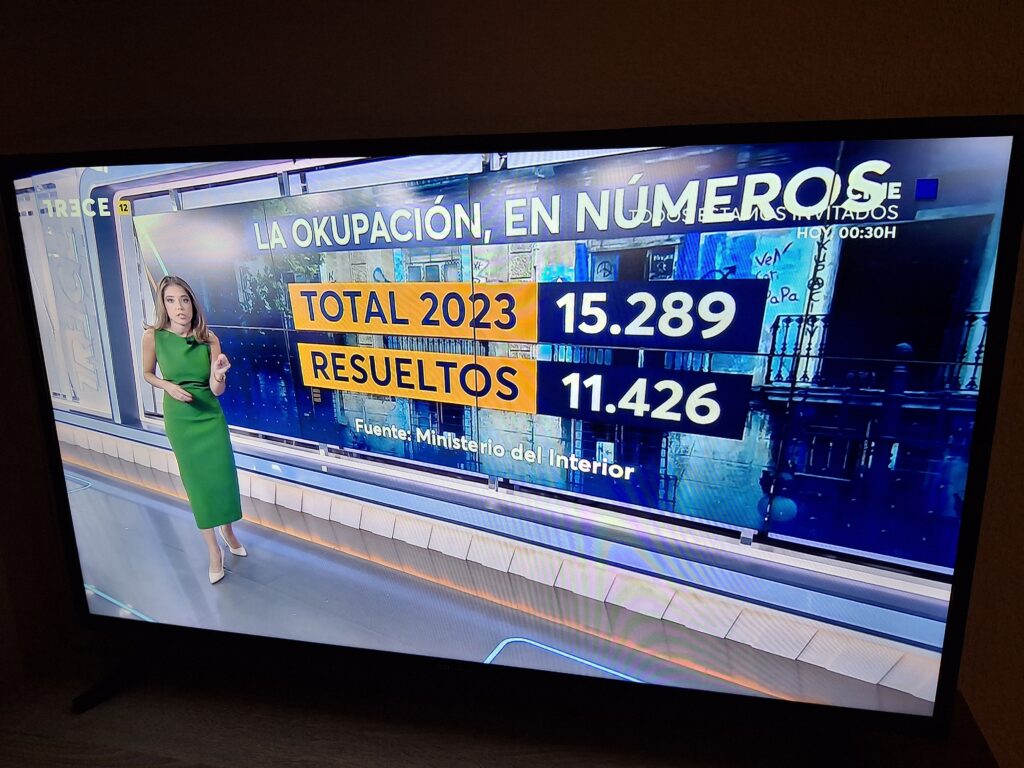Spain’s Squatting problem (“Okupas”)
A few months ago I received an email from one of our readers urgently asking us to refer him a lawyer.
He and his wife, who live in a popular hill town on the Costa del Sol, suddenly had a couple of issues to contend with. They had been away for some time while their Polish contractor was readying the house for them to move into. They came back home to find no contractor….and a Spanish couple and their cat living in their home.
The contractor was no longer contactable. He had disappeared. He had, of course, been pre-paid for a portion of his services. And the Spanish couple in the house said they had been invited by the contractor to live in the uninhabited house.
It seemed like the classic “Okupas” situation and our reader didn’t know what to do.

Spain’s Okupas problem
Most foreigners coming to Spain can’t wrap their heads around the squatting (or “Okupas” as it’s referred to) problem. When I first heard about it my reaction was ¨What, people can live in someone’s home and not be physically removed by authorities?! That’s crazy¨.
Spain has a complicated view of squatting and it’s obscured even more by the Spanish constitution which declares that all Spanish citizens have the right to decent and adequate housing. In law, the Urban Leases Act of 1994 allows people to occupy unused or abandoned properties without the owner’s permission. The intent of the law was to provide housing for the vulnerable.
In some cases, you can understand the law’s reasoning. During the 2008 financial crash for example, many buildings around Spain were left half-built or abandoned by developers. Squatters moved into many of these properties and ¨claimed right¨ to them.
Squatting took a different turn during Covid when holiday homes were uninhabited. They were easy targets for squatters who took over the properties, claiming ¨a right to housing¨.
Because of housing shortages and economic equality, the laws have been very lenient when it comes to squatting. In some areas, most specifically Catalonia (Barcelona has the highest rate of squatting in Spain), politicians and activist groups have worked to protect squatters and have even published a Squatting manual* to help squatters work around the laws.
*I’m not going to link it here but you can find it online.
But squatting is no longer done just by younger people or the homeless, it’s become professional. Professional scamming squatters hunt uninhabited apartments on real estate sites (if you’re advertising a home for rent or sale and its uninhabited, never disclose the address!) and even mafias are involved. Why? Because once they’re in your home they’ll work the system and it’ll take you years to get them out through the courts. They’re counting on owners coming to some kind of financial settlement to get them out. I’ve even read examples of mafia and mediators working hand-in-hand to extricate the maximum amounts possible from home owners.
So a law that was intended to provide housing for the vulnerable is now being abused by others.
Another thing: it’s not just people breaking into your uninhabited home and taking over. Some Okupas situations revolve around you renting your home to a family. They’ll pay the first month and then refuse to vacate. You can take them to court but again, the problem is the time the courts take to move things along. It might be years before the squatters can be removed.
So squatters, along with defaulting tenants, are a major problem for homeowners in Spain and something you have to prepare against.

The 48 hour law
The most important thing working for homeowners is the 48-hour rule. Under Spanish law, squatters can only be evicted right away if they’ve moved in within the last 48 hours (something called Immediate Eviction). If they’ve moved in within the last 48 hours and you can prove that the property is yours, police have the right to evict them without a court date.
Detecting squatters within 48 hours can be difficult if homeowners are away.
Some precautions you can take:
- Install security cameras and alarms.
- Hire someone (maybe a management company) to check on your property several times a week.
- Make friends with the neighbours and have a mutual arrangement to check on each other’s properties when away.
The goal is to detect squatters as quickly as possible and to report it to police within 48 hours. Doing so, the police have the right to evict them immediately.
Even so, scamming squatters have a few tricks.
- One of them is called ¨The Pizza Tactic¨ where they’ll order a pizza to your address. The pizza will come and the would-be squatter will wait outside, collecting the pizza and the receipt. Once 48 hours have passed, they’ll break into your home. If the police come, they’ll show the pizza receipt, showing they’ve “occupied¨ the home for more than 2 days.
- Squatters will sometimes change the locks, put chains on doors, weld doors shut….all to keep police from accessing the property immediately.
- They’ll bring more people into the home, including children and pets. Okupas with children and pets are always harder to get rid of (I’ve heard of Airbnb owners not wanting to rent to families with children because of this reason).
The police are wise to most of these tricks and *should* check with neighbours about the status of the owners. Another reason to maintain good relations with the people around you.

What if squatters have been in your home over 48 hours?
If it’s been over 48 hours then you need legal counsel and have to go through the process of getting a court eviction.
You’ll have to prove that the property is yours. So you’ll need proof of ownership, photos of the property, even neighbour witness accounts. If you travelled somewhere when the squatting took place you’ll have to show tickets and bills. The onus is on you as an owner to prove that the property is yours.
Once you’ve done the above, the squatters will be formally advised and they’ll have their chance to present their legal rights to ownership of the property or prove that they’re paying to be there. A decision will then be made and a date set for the squatters to leave. If they’re still there, the police will be able to forcibly remove them on this date.
Note however that the court system is slow and the squatters know their rights and how to manipulate the system. I’ve mentioned the Squatting manual above. It can take a few years to get rid of squatters, all while you’re paying all the bills associated with the property. And chances are these ¨tenants¨ aren’t going to take good care of your property so you don’t know what kind of shape your home will be in once you finally get them out.
Have a look at this post I found which details okupas stories.
(I’ll include a few more informational links at the bottom of this post).

Back to the Polish contractor and the Spanish couple
Our friend and his wife were lucky. The Spanish couple that had moved into their house were amiable enough and they struck a deal and agreed to leave. Once they did, the first thing our readers did was change the locks and have a security system put in.
They never heard back from their Polish contractor who disappeared with thousands of euros of money that was pre-paid for AC units, bathroom furniture and other odds and ends…
Be aware
In the end, our friends came out of this without too much loss. But they wanted their story told so that people are aware, not just of the potential issues with squatters but also of the fraudsters that you have to watch out for in the construction business.
A few interesting articles that helped me research this post:
Squatting handbook: learn the tricks and stop it from happening to you in Spain
Squatting in Spain: Understanding Spain’s “okupas” problem
Spanish Squatter Laws: Protecting Your Property As An Owner
The hard men removing squatters in Spain – BBC
Note: We share a lot of our posts on Facebook and I know people prefer to comment there. But if you’ve had a personal experience with squatting or know someone who has, I’d love if you could comment below. It allows everyone reading this post, no matter how they got to it, to benefit from other people’s experiences. Thank you!

A few useful Resources
Private health insurance in Spain. We recommend Innoinsure, they make it easy. And you don’t need a Spanish bank account – you can pay with foreign credit cards. More info here.
Spartan FX. Buying a house or car in Spain and need to transfer and exchange a large sum of money? More here.
Wise. For everyday transfers and exchanges of money from your home country. Nobody should be using banks anymore. More here.
Related: The best things about living in Spain


I totally agree with Ron and especially Siobhan . To all expat property owners if you do not have to rent then don’t. Our story will help explain why…
Old Age Pensioners Lose Life Savings in Spanish Rental Nightmare
“We may lose our dream home — and no one will help.”
We are pensioners who dreamed of spending our winters in the warmth of southern Spain. Like many Brits, we bought a modest home near Marbella, hoping the better climate would help our health and offer some comfort in our later years. That dream has now become a financial and emotional nightmare — one that may end with us losing everything.
We have lost nearly €50,000 over the past two years trying — and failing — to remove tenants from our property who have refused to pay rent or utility bills. Despite numerous meetings with Spanish lawyers and even the National Police, we’ve been told the same thing time and again: because the tenants have children, they are protected by Spanish law. There is virtually nothing we can do.
To pursue an eviction, we would need to initiate court proceedings that could take at least two more years, cost us another €5,000+ in legal fees (before expenses), and still offer no guarantee of success. Worse still, in many cases like ours, tenants are demanding “compensation” payments of €5,000 to €10,000 just to leave — effectively holding us to ransom in our own home.
This issue is far from isolated. Property owners across Spain — especially along the coast — are being devastated by this growing crisis. The law appears entirely skewed in favour of tenants, even when they stop paying rent altogether. Should we lose our property due to financial collapse, the law ensures the tenants will be rehoused — while we, the legal owners, face ruin.
You might ask: why did it take so long to act?
For the first year, the tenants paid rent regularly. Then, payments became sporadic — just enough to suggest to a court they were “trying.” Eventually, nothing. And by then, we were trapped.
We are sharing our story not for sympathy but to warn other property owners in Spain before they fall into the same trap. If you’re renting your property long-term in Spain, please, do the following:
• Use a Spanish lawyer to draft or review any tenancy agreement.
• Always obtain bank statements, employer references, and proof of solvency.
• Ensure you have comprehensive insurance, including cover for non-payment of rent (some Spanish insurers now offer this).
• Take clear photographs of the property’s condition — inside and out.
• Create a detailed inventory of every room and item.
• Employ a reputable property management company to conduct regular inspections.
• Do not return the deposit until you’re completely satisfied with the property’s condition.
• Be cautious of agents advertising on social media — do thorough background checks.
• Ask your lawyer about current laws regarding agent commission — some changes now make the owner or tenant responsible depending on region.
And our strongest advice?
If you don’t need to rent your property in Spain — don’t.
The law in Spain is not on the side of the owner, especially when children are involved. It is painfully easy to lose not only your rental income but your home and your peace of mind.
We are heartbroken. We are tired. And we are almost out of options.
Thank you so much for sharing this Andrew. An absolute nightmare, I’m so sorry to hear this story. The thing is that this just makes the housing crisis worse: Landlords won’t want to rent out (who would? I certainly wouldn’t) while, in the end, good tenants suffer for all the bums abusing the system. I’m sorry, you have our absolute sympathy and I wish you the best getting through this.
I think this situation is absolutely ludicrous. Long overdue to get the law changed to protect the legal owners FIRST before anyone else. Regardless of how the scum got in !!
Thank you for sharing this. After reading it, I had an alarm system installed with an antiokupa clause allowing the rep to come with the police to evict the potential okupas in less than 24 hours. It costs 40 € per month. A good investment to ensure my peace of mind
Great to hear Annie! $40 Euros worth it for peace of mind. And didn’t know about that antiokupa clause, sounds like you’re in good hands!
I’ve been burnt twice think I should have learned my lesson after the first time. Tenants recommended by estate agent paid 2 months rent ended up growing marijuana all over the house eventually left before the court case I was fined by the electricity company because they interfered with the meter,big mess to clear up. 2md time another estate agent English with the gift of the gab was receiving the rent and money for bills and didn’t pass on to us. He done this to a lot of people but got away with it over covid. We were awarded in court but will never see the money as he has moved on.
Now we have cameras a good alarm system good neighbours and peace of mind. We have learned our lesson.
Thank you Siobhan for recounting your story. Wow! So what do you do? I know what you say about a good alarm system and neighbours…but you never know what people will do once they rent your place, even if they look like they have money. It’s shocking that they’re allowed to get away with this. I wouldn’t want to be a landlord in Spain. I’d want to hire a couple of thugs to break knees but I would be the one going to jail which just isn’t right…
Great advice. I also would like to add that there are companies you can pay to negotiate with occupas to leave. We have ten investment apartments Madrid and have only had a problem when the previous owners refused to leave. The de occupa company got them in three months. There’s a lot of companies like this.
The other point is to minimize this problem we convert our apartments to be multiple suites. So you can always access the common areas to make eviction easier – but I’ve never had to do this.
Thanks for the feedback about your experience Leo. I’ve mentioned the ¨deoccupas¨ companies, it’s just sad that the situation has gotten this bad that you have to work outside the system to get a situation resolved in Spain. I for one would never want to get in the landlord business here after all the stories I’ve heard.
Thanks Frank. Definitely agree with you – sad that we need to “work outside the system”. I’ve owned investment properties in Australia and here. I know that there are a lot of bad stories but it actually can be quite rewarding in terms of helping reduce the housing crisis (I buy distressed properties that are uninhabitable and renovate and rent out). So far we have 10 and rent out almost 40 suites via an agent and never had any major issues since we started this 2.5 years ago. We will keep this going as a side hustle while working for now..
Ah, you’re a flipper! We used to watch this show in America about people who buy crappy homes and completely renovate them…and then rent or sell them to others. Always struck us as something that would be creative and fun to do. Congratulations on the business!
Flipping means we sell the properties but we keep them and rent them out. We haven’t sold any of them. Thanks for the congratulations.
I had a tenant who left the house in an awful mess when she vacated. As we were clearing the house out this lady offered to help, asked me to rent it to her and was very pleasant. I told her it was for sale not rent and the agent was very busy with viewings, including her family.
Apparently she moved in on a Thursday evening then phoned the agent after the 48 hours were up to tell him to take it off the market as it was theirs now. I am highly suspicious of the agent as he didn’t keep a log of viewing or details of anyone who viewed…
Both the police and solicitor mentioned disokupados who evict squatters.
however at the moment the squatters appear to be running rings round the Disokupados – threatening them with legal action!
who knows how this will end as I have paid the Disokupados, I am paying electric and water bills and apparently anything of worth has been removed from the house…
Terrible. It’s sad that you’re having to hire thugs to get rid of squatters, just because the authorities can’t cope with the situation.
Thank you for telling your story.
The law has changed and the 48 hours rule doesnt apply anymore since a few years ago. It would be good to have a read and repost. The internet is full of missinformation regarding this matter.
Sorry, that’s not true Maria. All the links I’ve included are from 2024 and the 48 hour law does apply. Google it, you’ll see other recent articles stating the 48 hour law.
This is priceless information and I feel like anyone who’s even thinking of buying property in Spain should educate themselves about this. But was it important to make the point that the carpenter was Polish? In this day and age there are plenty that will attribute this misdeed as due to his being Polish rather than just being due to his dishonesty in general. To me it seems like this would hit home better and be more valuable for people to be very wary of anyone having open access to their property while they are away, regardless of them being from Poland, or Spain, or even wherever the property owner is from.
It might even be valuable to give folks tips on locating legitimate property management companies that offer this kind of property access service that are both trustworthy and a good value with reasonable rates.
Thank you Chris. I see your point, but I’m also telling a story. I’ve had interviewees write in the past about unscrupulous British contractors to watch out for. I don’t like to censor something unless it really goes over the line. Do I have to leave out that the Okupas couple were Spanish? It’s not about the contractor being Polish or British or even Canadian, it’s just being honest to the story.
Appreciate the comment though.
This is what you get with a Socialist government in place.
I’m afraid to say you’re right…
When we had Squatters on the Community during the Pandemic, the Guardia Civil said they were powerless to do anything and suggested the owner hire an Antiokupas company. It should be noted that the owner of the house did not have a connected alarm system, which would have proved that the squatters had only been there 24 hours instead of the ‘3 weeks’ they quoted. The owner tried to get them out by the Court system but this was too slow and eventually he did use Antiokupas. Total cost with Solicitors fees, Antiokupas fee and payment to the squatters was €10k, but at least he got his €400k house back. The house was up for sale, so this is how we think the ‘firm’ got in to suss things out, because we are a small gated Community. The damage the squatters did to his house and to the Community, was awful, and it cost him and the Community to put things right and a small fortune for owners to ‘up their security’.. They even cut off people’s electricity, in spite. So get yourself a ‘connected alarm system’ approx cost 40/45€ a month but well worth it, and keep good friends with your neighbours !!
Thank you Sue for the great comment. It’s true, I read that somewhere: during Covid there were laws in place that they could not evict squatters. So a holiday for squatters. Unbelievable.
Thank you so much for the comment, great to hear personal stories.
I wish everyone knew about this, I know a few people who have had issues with this including one friend who’s had okupas in his home for over a year now. It’s ridiculous and has given me 2nd thoughts on ever buying a home in Spain.
I don’t know honestly how this can be allowed to go on. Thank you Jack.
This is great advice, I am at the moment starting to plan aneighbourhood watch group as an apartment on our urbanization has squatters , my first move is to contact the local police liaison officer and try to work with our admin to e-mail all owners etc , if you have any advice I would appreciate it . Regards Ray
I don’t Ray but good luck. I don’t know how useful the police will be but getting all the neighbours together is really I think the key. All the best!